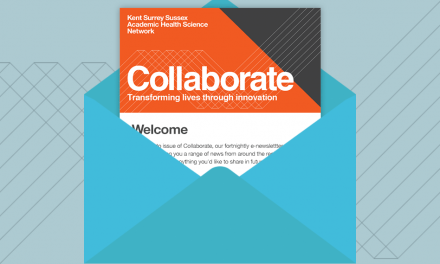To mark the new year we’ve created a series of blogs looking at what 2020 has in store for various elements of the region’s health and social care economy.
This week Des Holden, Medical Director at KSS AHSN and Implementation Lead for the Applied Research Collaboration KSS, looks at the role of research within health and care systems.
With Christmas behind us, and the health and care systems working hard to meet winter demand, the Applied Research Collaboration KSS (ARC KSS) is now in Q2 of its first funded year.
In Kent, the Design and Learning Centre and Kent County Council are working to mobilise and develop a community of practice with social workers. We met the DLC and Anna Tidmarsh and talked about the model of care where people are supported to live in their own homes for as long as possible, delaying escalation into looked after accommodation.
Strategic approach
This is a strategy that consumes a great deal of resource but exactly what is effective and well thought of in this aim is not well understood – an area ripe for research and evaluation and of interest nationally.
ARC KSS leads on social care research on behalf of all 15 of England’s ARCs. Last week Surrey hosted an event where theme leads from the ARC and academics from the University shared the areas of research they are most excited about.
This event, and others that will follow, are vital to help theme leads know the richness of work that is already happening, and hear from and meet people who the ARC intends to bring together so that citizens of our region can benefit from academic discovery.
New roles
KSS AHSN has continued to support the ambition of the Applied Research Collaboration in Kent Surrey and Sussex by appointing four theme implementation leads.
Kath Sykes (ageing well/ dementia), and Becky Sharp (social care) have been promoted from within the AHSN where they worked in the Tech Navigation and Patient Safety teams respectively.
Sam Fraser (primary and community care) is currently one of the third cohort of Darzi Fellows, completing her leadership PGCert in March.
The fourth implementation lead, Becca Randall (starting life well, young persons’ mental health) is joining the AHSN from children’s’ service commissioning in West Sussex.
Informed research
The implementation leads will work with their respective academic leads, and with the leads of the ARC’s four cross cutting themes (public health, co-design, digital, capability) to ensure that the voices of people living with health and social care needs, and staff who are meeting those needs, help inform our research agenda.
By getting this level of real world knowledge into research questions there is a better chance that the answers will be seen as important at the front line where care is delivered, and therefore adopted into practice.
This is the main aim of the NIHR initiative. The other benefit of working in this way is that the communities of practice that form around these themes can help articulate their needs to other AHSN partners, including industry and educationalists.
Needs articulation is the first building block of the innovation exchange, the AHSN national network methodology for bringing innovation into practice and thereby transforming lives. The ARC implementation leads therefore not only underpin the success of the A of ARC, they help the AHSN deliver its core NHSE and Office of Life Science commission as well.
Other blogs in this series:
- James Wood, CEO of Community Pharmacy Surrey and Sussex, outlines opportunities and key areas of development for pharmacy
- Jo Congleton, Clinical Lead, KSS AHSN Respiratory Programme and Consultant in Integrated Care SCFT/BSUH, looks to future developments within the field of respiratory.
- Rob Berry, Head of Innovation at KSS AHSN reflects on the AHSN Network’s evolving offer to health technology innovators
- Guy Boersma, Managing Director of KSS AHSN, discusses why 2020 must see a tipping point for digital and AI solutions in health and social care.





